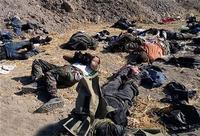-
Law enforcement agencies use technology to compensate for shrinking budgets
With funding shrinking in many sectors of law enforcement, agencies are searching for new ways to operate affordably while maintaining quality standards.Police departments’ budgets quadrupled between 1982 and 2006. With federal budgets shrining, there are simply too many challenges which would not allow for police budgeting-as-usual.
-
-
California agriculture faces greatest water loss ever seen
California produces nearly half of U.S.-grown fruits, nuts, and vegetables, and nearly a quarter of the nation’s milk and cream. Across the nation, consumers regularly buy several crops grown almost entirely in California, including tomatoes, carrots, broccoli, almonds, walnuts, grapes, olives, and figs. Researchers show that California agriculture is weathering its worst drought in decades due to groundwater reserves, but the nation’s produce basket may come up dry in the future if it continues to treat those reserves like an unlimited savings account.
-
-
California crippling drought linked to climate change: Scientists
The extreme atmospheric conditions associated with California’s crippling drought are far more likely to occur under today’s global warming conditions than in the climate that existed before humans emitted large amounts of greenhouse gases. Researchers used a novel combination of computer simulations and statistical techniques to show that a persistent region of high atmospheric pressure hovering over the Pacific Ocean that diverted storms away from California was much more likely to form in the presence of modern greenhouse gas concentrations.
-
-
Assad retains secret caches of chemical weapons: Israeli intelligence
Despite committing to dismantle and give up its chemical weapons – Syria was in possession of the world’s largest chemical weapons stock — President Bashar al-Assad’s regime still maintains a “residual” chemical weapons capacity, consisting of a few tons of the proscribed materials. Israel’s intelligence community has concluded that the Assad regime has decided to keep this reduced, but still formidable, chemical weapons capability, and has successfully concealed it from the inspectors of the UN chemical weapons watchdog who, a few weeks ago, have declared the chemical disarmament of Syria to be officially complete. Israeli defense officials believe that these sarin gas weapons would likely be deployed if the Assad regime faced an imminent threat to its survival. The Syrian regime is continuing to use chemical weapons which were not covered by the U.S.-Russian chemical weapons disarmament agreement, especially chlorine gas.
-
-
Cost of U.S. war on ISIS reaches $780 million
The cost of the war against the Islamic State (ISIS) Islamist group has totaled at least $780 million, according to a new estimate, as U.S. warplanes and drones continued to strike Isis positions in Iraq and Syria on Monday and Tuesday. Defense Secretary Chuck Hagel said on Friday that the U.S. military is spending up to $10 million a day and will likely request more money from Congress to fund the war. The attacks on ISIS began 8 August, and before they were expanded to include targets in Syria, the Pentagon estimated the daily war costs at $7.5 million.
-
-
$3 million in grants for three pilot projects to improve online security, privacy
The National Institute of Standards and Technology (NIST) the other day announced nearly $3 million in grants that will support projects for online identity protection to improve privacy, security and convenience. The three recipients of the National Strategy for Trusted Identities in Cyberspace (NSTIC) grants will pilot solutions that make it easier to use mobile devices instead of passwords for online authentication, minimize loss from fraud and improve access to state services.
-
-
Obama: U.S. intelligence underestimated ISIS strength, overestimated Iraqi military's resilience

President Barack Obama on Sunday said that the U.S. intelligence community had underestimated Islamic State (ISIS) strength and level of activity inside Syria, which has become “ground zero” for jihadist terrorists worldwide, while overestimating the ability of the Iraqi army to fight such militant groups. Obama’s admission that ISIS succeeded in setting up its bases in Syria and Iraq without being noticed by U.S. intelligence may embolden Republican hawks such Senators John McCain (R-Arizona) and Lindsey Graham (R-South Carolina) who have been complaining for months that the administration was being too passive in its approach to the Syrian civil war.
-
-
ISIS, al-Nusra reconcile as Syria air strikes continue

Under continuing strikes by U.S. and coalition air forces, ISIS moved toward a new alliance with Syria’s largest al-Qaeda-affiliated group. Jabhat al-Nusra, which has been at odds with ISIS for more than a year now, was also subjected to U.S. air strikes which killed scores of the group’s members. Many al-Nusra units in northern Syria now appear to have reconciled with ISIS, following months of bitter clashes between the two groups.
-
-
New DOJ pilot program aims to deter Americans from joining terrorist groups
Boston, Los Angeles, and Minneapolis will host the Justice Department’s (DOJ) pilot program aimed at deterring Americans from joining terrorists groups, particularly those fighting in Syria and Iraq under the Islamic State (IS) and Somalia under al-Qaeda-affiliated al-Shabaab. The program will rely on prevention and intervention initiatives.
-
-
U.S. strategy for fighting ISIS includes outreach to Muslims-American communities
The White House is planning a summit in October to consider domestic extremism – a summit which will include Muslim faith-based organizations, mental health providers, social services groups, and youth-support organizations. The leaders of U.S. security services agree that Muslim-American communities should be seen as the “front lines” against the efforts of terror groups to recruit impressionable youth.
-
-
Departures, vacancies continue to hobble DHS
The rate of senior level departures at DHS has increased in recent years, and some say that as a result, the department is unable to stay ahead of emerging threats, including potential terrorist and cyber incidents. According to the FedScope database of federal employees administered by OMB, between 2010 and 2013, departures of permanent DHS employees increased by 31 percent, compared to a 17 percent increase for the entire federal workforce.
-
-
Tension between humanitarian ideals, fear of terrorism in European asylum decisions
New research has found that European states that experienced a terrorist attack on their own soil since 1980 were less likely to grant asylum to refugees. The study also found, however, that on the whole, concerns over terrorism in Europe have not eroded underpinnings of the Geneva Convention’s principles regarding asylum admission.
-
-
Better regional coordination for port security
In the days following the 9/11 terrorist attacks, first responders in the Northeast were suddenly responsible for monitoring potential targets, including a military base, nuclear power plants, and a deep water port. Emergency teams soon found out that they were ill-equipped to coordinate with one another. That realization prompted better organization among regional first responders.
-
-
South Carolina reflects on Hurricane Hugo anniversary
The state of South Caroline has just eyed the twenty-fifth anniversary of Hurricane Hugo – the Category 4 storm that hit the coast on 21 September 1989 with sustained maximum winds of 138 mph. Many in the state still honor that event, and live with the memory of the severe coastal damage due to drastic storm surges and the forty-nine lives lost during the disaster. The storm also left 60,000 people homeless, with 270,000 temporarily unemployed and 54,000 residents seeking monetary assistance. Extending far beyond that were many others who did not have power for two weeks or longer.
-
-
A first: Jury finds bank guilty of financing terrorism
In a major development on the terrorism financing front, a U.S. jury found Arab Bank Plc liable for providing material support to Hamas and ordered the bank to compensate nearly 300 Americans who are either victims or relatives of victims of at least two dozen attacks tied to Hamas in Israel and the Palestinian territories.
-
More headlines
The long view
Preventing Another 'Jan. 6' Starts by Changing How Elections Are Certified, Experts Say
The 2024 presidential election may be a rematch between President Joe Biden and former President Donald Trump, but preventing a repeat of Jan. 6, 2021 — when false claims of a stolen election promoted by Donald Trump and his allies led to an insurrection at the U.S. Capitol —will be top of mind this election year. Research finds broad support among public for nonpartisan certification commissions.
States Rush to Combat AI Threat to Elections
This year’s presidential election will be the first since generative AI became widely available. That’s raising fears that millions of voters could be deceived by a barrage of political deepfakes. Congress has done little to address the issue, but states are moving aggressively to respond — though questions remain about how effective any new measures to combat AI-created disinformation will be.
Chinese Government Hackers Targeted Critics of China, U.S. Businesses and Politicians
An indictment was unsealed Monday charging seven nationals of the People’s Republic of China (PRC) with conspiracy to commit computer intrusions and conspiracy to commit wire fraud for their involvement in a PRC-based hacking group that spent approximately 14 years targeting U.S. and foreign critics, businesses, and political officials in furtherance of the PRC’s economic espionage and foreign intelligence objectives.
European Arms Imports Nearly Double, U.S. and French Exports Rise, and Russian Exports Fall Sharply
States in Europe almost doubled their imports of major arms (+94 per cent) between 2014–18 and 2019–23. The United States increased its arms exports by 17 per cent between 2014–18 and 2019–23, while Russia’s arms exports halved. Russia was for the first time the third largest arms exporter, falling just behind France.
LNG Exports Have Had No Impact on Domestic Energy Costs: Analysis
U.S. liquified natural gas (LNG) exports have not had any sustained and significant direct impact on U.S. natural gas prices and have, in fact, spurred production and productivity gains, which contribute to downward pressure on domestic prices.
Don’t Buy Moscow’s Shameless Campaign Tying Biden to Its Terrorist Attack
Russia has offered many different explanations to the ISIS-K’s 22 March 2024 terrorist attack at the Crocus City Hall in Moscow, but the most recent explanation offered by Russia is the most audacious yet: Russia now charges that the Ukrainian energy company Burisma financed the attack. Burisma is at the center of an effort by a congressional committee to impeach President Biden, but the case has all but collapsed. Hunter Stoll writes that Russia’s disinformation and propaganda apparatus appears to be searching for ways to keep Burisma in the news ahead of the U.S. presidential election.
